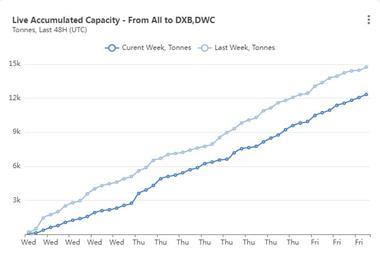Freight forwarders and shippers are continuing to push for longer term air cargo deals as they look to avoid potential rate hikes due to the risk of supply chain disruption.
A half-year market report from analyst Xeneta shows that contracts of more than six months accounted for 54% of the market in the second quarter of 2024 compared with 30% a year earlier.
Spot deals (one-month contracts) in the second quarter accounted for 10% of the market against 12% for the period in 2023, three-month deals are at 18% of the market compared with 23% last year and six-month deals are at 18% compared with 35%.
The analyst said the move towards longer term deals has been ongoing since last year, but the motivation for doing so has evolved.
The report said that the longer term deals signed last year are probably a reflection of a calmer market.
However, those signed since then are the result of the sudden surge in e-commerce demand and the Red Sea crisis that has hit ocean shipping.
"Far from it being a calm market, freight buyers are eager to lock in their rates for the Q4 peak season before the market escalates further amid the threat of a squeeze on available capacity," the Xeneta report said.
The report also highlighted four potential risks to air cargo supply chains that could cause further disruption as the year progresses: Geopolitical risks; cyber attacks/IT vulnerability; natural disasters; and 'who knows'.
"Political unrest in the Middle East and Ukraine, along with potential US East and Gulf Coast strikes, could put upward pressure on cargo rates during the year-end air cargo peak season. Meanwhile, potential weakening consumer demand could put downward pressure on rates," the report said.
Meanwhile, a potential Donald Trump presidency and an associated rise in protectionist measures would likely cause "a rush in demand from China ahead of new tariffs".
"However, in the mid-term, this will dampen air cargo demand for the affected corridors until new trade flows are established."
On IT vulnerabilities, the report pointed to the impact of the recent Crowdstrike IT outage on aviation and also a rise in cyber attacks against large organisations.
For natural disasters, Xeneta used the examples of the flash flooding in Dubai and the impact of drought on the Panama Canal as examples of how supply chains can be affected.
And for 'who knows' Xeneta said the next black swan event could be around the corner "especially while the world continues to be in a precarious position geo-politically".












